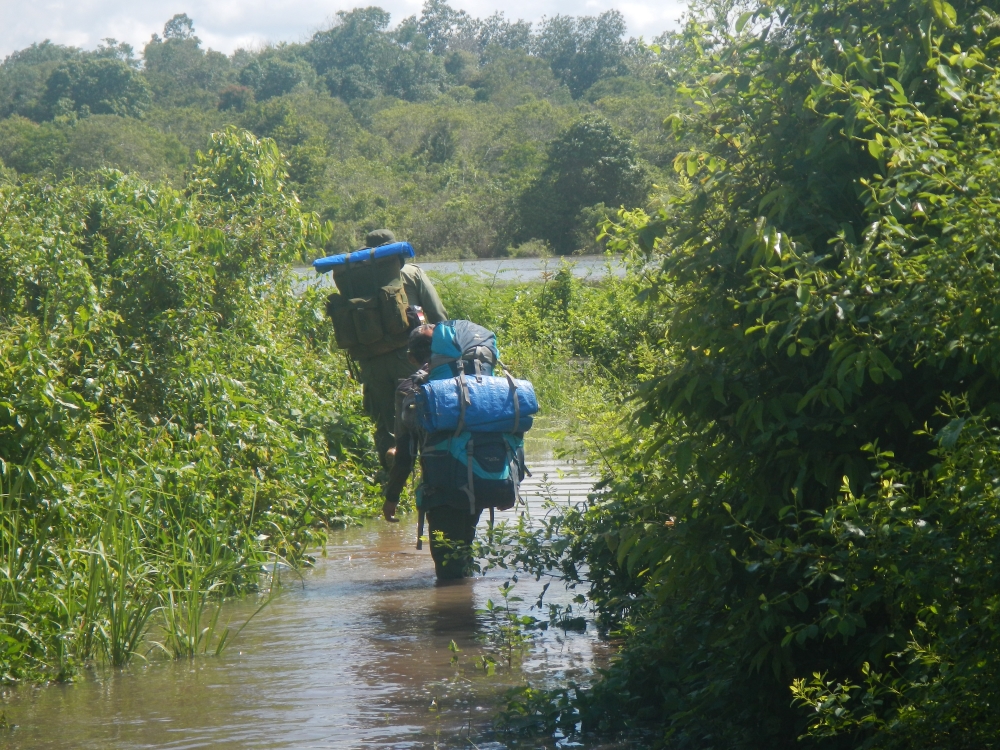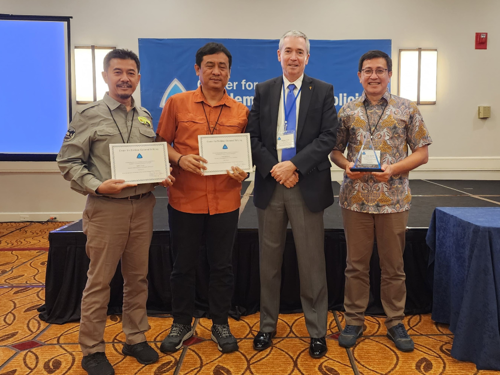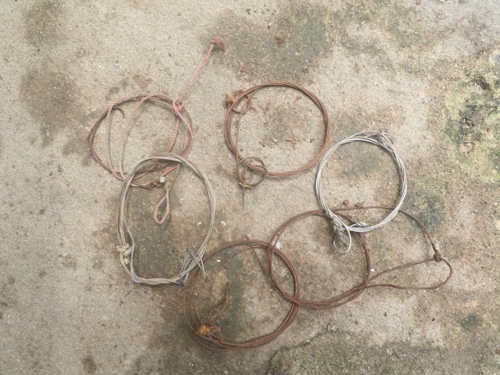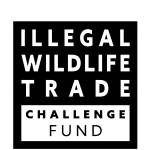Reforming poachers to reduce snaring

Patrolling activity in Margahayu, Way Kambas National Park. Credit - Edi Sarjono.
Problem-Oriented Wildlife Protection Approach: Reforming Poachers to reduce snaring in Indonesia
Way Kambas National Park (WKNP), located in Sumatra, Indonesia, is achieving notable progress in conservation through an innovative approach to address poaching and protect endangered species like the Sumatran tiger, rhino, and elephant. Through the Problem-Oriented Wildlife Protection (POWP) approach - an adoption of Problem-Oriented Policing for wildlife conservation - poaching activities in the park have significantly reduced. Their approach offered alternative livelihoods, focused patrols, and raised awareness regarding set rules for entering and gathering resources from the national park. This method has not only led to a dramatic decrease in snares but has also earned international recognition, including the prestigious Herman Goldstein Award for Excellence in Problem-Oriented Policing in 2024.

The challenges: Snaring in Way Kambas National Park
WKNP was designated as an ASEAN Heritage Park in 2015 due to its exceptional biodiversity, significant ecosystems, and important conservation efforts. However, it faces severe threats from human-induced pressures such as hunting and grassland / forest fires. In response to the chronic snaring of ungulates, the WKNP office and Wildlife Conservation Society implemented the POWP approach in the Margahayu resort (the smallest administrative sector in Indonesian national parks). The approach focuses on a four-stage model called SARA: Scanning, Analysis, Response, and Assessment.
The approach: Problem-Oriented Wildlife Protection
In the first stage, we identified the most acute problem in the national park by scanning integrated data from various sources, most notably patrol data from 2016 to 2020. We discovered that two out of twelve resorts in WKNP, Margahayu and Susukan Baru, had chronic snaring problems, while Rawa Bunder resort has emerging snaring threats. This data-driven approach led us to prioritise Margahayu for intervention, with the other two resorts acting as ‘control’ sites for comparison.
Having developed our problem statement, we analysed various data such as snare locations, timelines, poacher profiles, and modus operandi to better understand the snaring problem in Margahayu. The park management identified seventeen individuals who were actively poaching in four areas within the resort. Nine of them were initiators (those who organised hunting trips) and eight were followers, members of a hunting group who accompanied an initiator. We interviewed five of them (three initiators and two followers) to understand their motives and how they perceive hunting in a protected area, and, according to them, they did not enjoy hunting; rather, they saw it as a means of income. They expressed a strong desire for alternative livelihoods, a critical insight that shaped our response.
In the next stage, we initiated a three-pronged response. First, in December 2020, the WKNP office provided the five identified hunters with duck farming opportunities. Duck farming offered a sustainable income source, helping the hunters transition into a legitimate business and reducing their reliance on illegal activities. Second, focused patrols were conducted in the snaring hotspots of Margahayu, Susukan Baru, and Rawa Bunder. This enabled WKNP patrol teams to continue destroying snares and monitoring their distribution during our targeted intervention. Third, in May 2021, we initiated awareness-raising activities in specific villages, aiming to educate and deter other potential hunters operating across all three resorts.
During the final stage, we assessed the effectiveness of our targeted intervention. Three consecutive years after implementation, we observed a significant decrease in snaring, particularly in Margahayu by 94% in 2021, 84% in 2022, and 74% in 2023, compared to the 2020 baseline. The results in Susukan Baru have been mixed, with a 33% decrease in 2021 and a 56% decrease in 2022, but an alarming 118% increase in 2023. Being the control, we see this increase might be prompted by the lack of direct intervention to poachers, particularly through understanding their motives and then addressing them, as we did with the poachers in Margahayu. Patrolling is one of the interventions to reduce poaching, however, another type of intervention is required to significantly decrease poaching pressure, as learned from the Margahayu case study. In Rawa Bunder, the snare counts decreased by 87% in 2021, 93% in 2022, and 29% in 2023.
The significant decrease in snaring in Margahayu highlights the success of the targeted interventions. But, beyond the numbers, the real success lies in the personal transformation of the poachers. One of them said, “I feel more at ease now with my small cattle farm to support my livelihood compared to when I relied on hunting. I feel more comfortable in my community, as there is no longer negative talk about me.”

International recognition
The success of this pilot project in WKNP has received both national and international recognition. It was featured in the Indonesian Ministry of Environment and Forestry’s guide entitled ’100+ Innovations of the Directorate General of Natural Resources and Ecosystem Conservation’ (Wiratno et al., 2022). Internationally, it is recognised as a leading project in wildlife crime prevention and won the prestigious Herman Goldstein Award for Excellence in Problem-Oriented Policing 2024, competing against four other candidates from the United Kingdom and the United States.
Next step and conclusion
Inspired by these positive outcomes, the project is applying the use of POWP in two national parks: First, to tackle bushmeat poaching in Bogani Nani Wartabone National Park in North Sulawesi and Gorontalo provinces, and second, to combat songbird poaching in Bukit Barisan Selatan National Park in Lampung province. In collaboration with the Indonesian government, we hope this model will inspire broader replication, both in other areas within the park and across additional parks, as well as by other institutions. More broadly, we are enhancing the skills of the park management teams and partners to implement the POWP approach in both terrestrial and marine areas.
The WKNP pilot project demonstrates the potential of POWP to address complex conservation challenges. By focusing on the root causes of poaching and offering practical solutions, we have achieved positive results while fostering change in local communities. The successful pilot sets the stage for broader application across other parks and regions, especially to tackle wildlife and environmental crimes. We have learned to approach problems more systematically and critically, with no definitive endpoint; therefore, the assessment and analysis process will continuously adapt to new challenges as they emerge.
Written by Dian Risdianto, Hanifah Siregar, and William Marthy. For more information on this Illegal Wildlife Trade Challenge Fund Main project IWT123, led by the WCS, please click here.
References
Ministry of Environment and Forestry. 2024. BTN Way Kambas Raih Penghargaan Internasional Herman Goldstein Award. [Press release No. SP.227/HUMAS/PPIP/HMS.3/9/2024].
Susyafrianto J., Kuswandono, Hermawan, Krismurniati E.D., Sukatmoko, Rohman, F., Sugiyo, Tawaqal F., Lubis, M.I. 2024. An integrated approach to tackling wildlife crime: Impact and lessons learned from reforming hunters to reduce snaring in a flagship protected area in Sumatra, Indonesia.
Wiratno, Sya’bani, B., Nisaa, Z., Sumidi, Ariyanto, A.C. & Anggoro, M.D. 2022. 100+ Inovasi KSDAE. Direktorat Jenderal Konservasi Sumber Daya Alam dan Ekosistem, Jakarta.
Wildlife Conservation Society. 2024. WCS Impact Report 2024.

 Back
Back